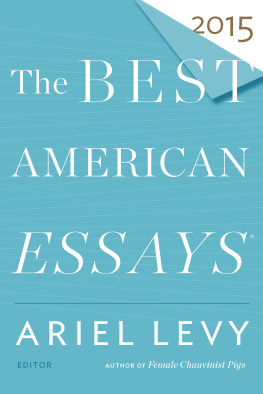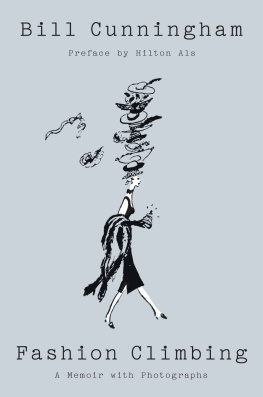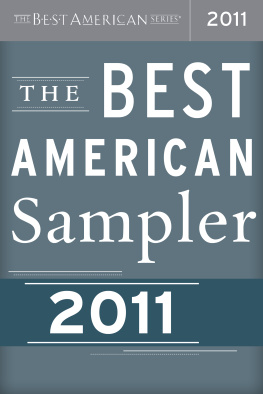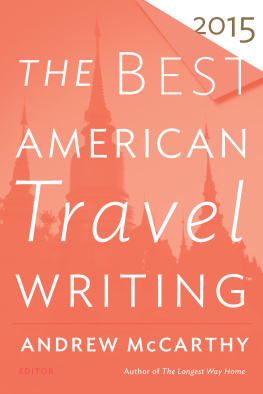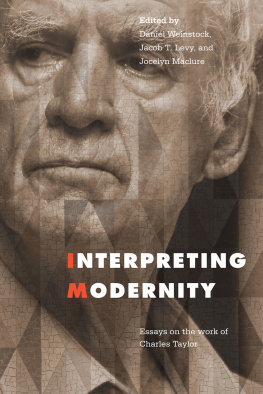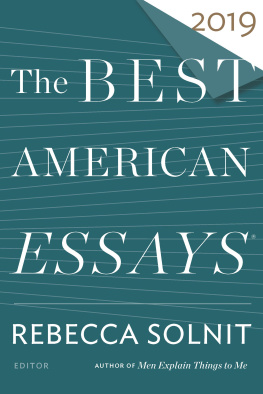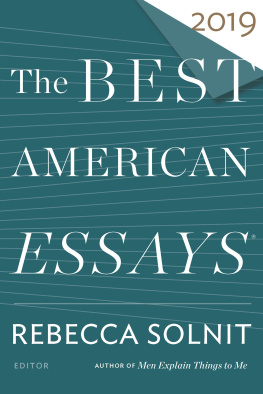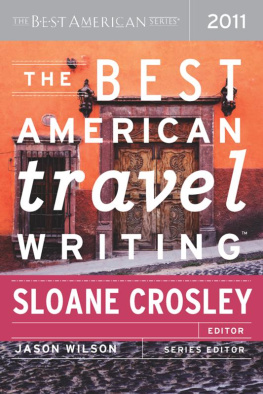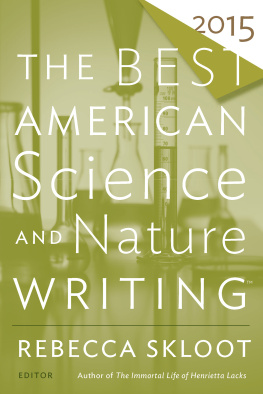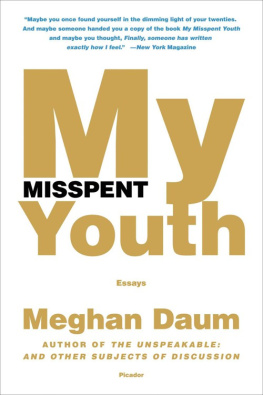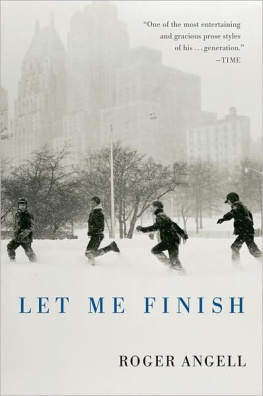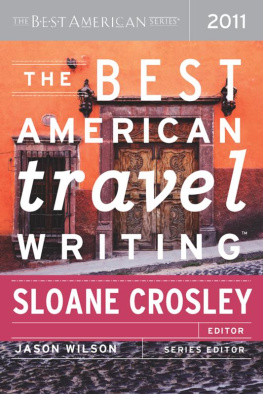Copyright 2015 by Houghton Mifflin Harcourt Publishing Company
Introduction copyright 2015 by Ariel Levy
ALL RIGHTS RESERVED
The Best American Series and The Best American Essays are registered trademarks of Houghton Mifflin Harcourt Publishing Company.
No part of this work may be reproduced or transmitted in any form or by any means, electronic or mechanical, including photocopying and recording, or by any information storage or retrieval system without the proper written permission of the copyright owner unless such copying is expressly permitted by federal copyright law. With the exception of nonprofit transcription in Braille, Houghton Mifflin Harcourt is not authorized to grant permission for further uses of copyrighted selections reprinted in this book without the permission of their owners. Permission must be obtained from the individual copyright owners as identified herein. Address requests for permission to make copies of Houghton Mifflin Harcourt material to Permissions, Houghton Mifflin Harcourt Publishing Company, 215 Park Avenue South, New York , NY 10003.
www.hmhco.com
ISSN 0888-3742
ISBN 978-0-544-56962-1
Cover design by Christopher Moisan Houghton Mifflin Harcourt
e ISBN 978-0-544-57921-7
v1.1015
Islands by Hilton Als. First published in Transition, no. 113. Copyright 2014 by Hilton Als. Reprinted by permission of the Wylie Agency, LLC.
This Old Man by Roger Angell. First published in The New Yorker, February 17 and 24, 2014. Copyright 2014 by Roger Angell. Reprinted by permission of Roger Angell.
Charade by Kendra Atleework. First published in Haydens Ferry Review, Fall/Winter 2014. Copyright 2014 by Kendra Atleework. Reprinted by permission of Kendra Atleework.
A Message to the Twenty-First Century by Isaiah Berlin. First published in the New York Review of Books, October 23, 2014. Copyright 2014 by Isaiah Berlin. Reproduced with permission of Curtis Brown Group Ltd, London, on behalf of the Isaiah Berlin Literary Trust.
Strange Days by Sven Birkerts. First published in Laphams Quarterly, Fall 2014. Copyright 2014 by Sven Birkerts. Reprinted by permission of Sven Birkerts.
Vision by Tiffany Briere. First published in Tin House, vol. 15, no. 3, 2014. Copyright 2014 by Tiffany Briere. Reprinted by permission of Tiffany Briere.
My Daughter and God by Justin Cronin. First published in Narrative, Spring 2014. Copyright 2014 by Justin Cronin. From When I First Held You edited by Brian Gresko, Penguin 2014. Reprinted by permission of Trident Media Group.
Difference Maker by Meghan Daum. First published in The New Yorker, September 29, 2014. Copyright 2014 by Meghan Daum. Reprinted by permission of Meghan Daum.
Thing with Feathers That Perches in the Soul by Anthony Doerr. First published in Granta (Issue 128), Summer 2014. Copyright 2014 by Anthony Doerr. Reprinted by permission of Anthony Doerr. The Poems of Emily Dickinson, edited by Thomas H. Johnson, Cambridge, Mass.: The Belknap Press of Harvard University Press, Copyright 1951, 1955, 1979, 1983 by the President and Fellows of Harvard College.
The Crooked Ladder by Malcolm Gladwell. First published in The New Yorker, August 11 and 18, 2014. Copyright 2014 by Malcolm Gladwell. Reprinted by permission of Malcolm Gladwell.
65 by Mark Jacobson. First published in New York, April 720, 2014. Copyright 2014 by Mark Jacobson. Reprinted by permission of New York.
Scenes from a Life in Negroland by Margo Jefferson. First published in Guernica, June 16, 2014. Copyright 2014 by Margo Jefferson. Reprinted by permission of Margo Jefferson.
Smuggler by Philip Kennicott. First published in Virginia Quarterly Review, Fall 2014. Copyright 2014 by Philip Kennicott. Reprinted by permission of Philip Kennicott.
A Man and His Cat by Tim Kreider. First published in the New York Times, August 3, 2014. Copyright 2014 by Tim Kreider. Reprinted by permission of Tim Kreider.
The Loudproof Room by Kate Lebo. First published in New England Review, vol. 35, no. 2, 2014. Copyright 2014 by Kate Lebo. Reprinted by permission of Kate Lebo.
My Grandma the Poisoner by John Reed. First published in Vice, October 2014. Copyright 2014 by John Reed. Reprinted by permission of John Reed.
Reflections on Indexing My Lynching Book by Ashraf H. A. Rushdy. First published in Michigan Quarterly Review, vol. 53, issue 2, Spring 2014. Copyright 2014 by Ashraf Rushdy. Reprinted by permission of Ashraf Rushdy.
Stepping Out by David Sedaris. First published in The New Yorker, June 30, 2014. Copyright 2014 by David Sedaris. Reprinted by permission of David Sedaris.
Find Your Beach by Zadie Smith. First published in the New York Review of Books, October 23, 2014. Copyright 2014 by Zadie Smith. Reprinted by permission of Rogers, Coleridge & White.
Arrival Gates by Rebecca Solnit. First published in Granta, no. 127, Spring 2014. Copyright 2014 by Rebecca Solnit. Reprinted by permission of Granta and Trinity University Press.
My Uniform by Cheryl Strayed. First published in Tin House, vol. 15, no. 3, 2014. Copyright 2014 by Cheryl Strayed. Reprinted by permission of Cheryl Strayed.
It Will Look Like a Sunset by Kelly Sundberg. First published in Guernica, April 1, 2014. Copyright 2014 by Kelly Sundberg. Reprinted by permission of Kelly Sundberg and Guernica.
Foreword: Of Essays and Essayists
W HEN I STARTED to write the first Foreword to this series, now in its thirtieth year, I remember thinking that it would be appropriate, perhaps necessary, to define what I meant by an essay. Here was a new series of books calling attention to a genre that at the time the literary world did not take very seriously. It was hard to forget that just a few years before we launched the series, Americas most renowned essayist, E. B. White, acknowledged that the essayist, unlike the novelist, the poet, and the playwright, must be content in his self-imposed role of second-class citizen. If, as White suggested, essays would not win anyone a Nobel Prize, how substandard were they? What exactly was the literary production that this new series would showcase and celebrate?
Thirty years later and Im still asking myself that question. I think its clear that the status of the essay has improved over that time (the longevity of this series being a part of the evidence), but a solid, tight definition of the genre featured thus far throughout thirty volumes continues to elude me. I would, of course, happily use anothers definition if I could find one I thought satisfactory. With so many different types of essays being published year after year, it seems impossible to identify a few essential features that characterize the genre and encompass all its forms. But perhaps one way into the matter of definition is to ask not what essays are but what essayists do. What do they do differently from what the generally more respected writers in other genres do? And where else to begin but with Michel de Montaigne?
Its well known that the origin of the modern essay is usually traced to one writer who began composing odd prose pieces in the 1570s. At first he had no literary category to describe what he was doing, nor did he appear even to possess conventional rhetorical aims. In nearly all previous prose compositions, the act of writing remained in the background; Montaigne is perhaps the first to foreground the writing process. In his prose, he refused to adopt, as did his contemporaries, a professional, scholarly, clerical, or judicial authority. He allowed himself no authoritative postureonly that of being an author. As his pieces accumulated, Montaigne settled on the word
Next page
